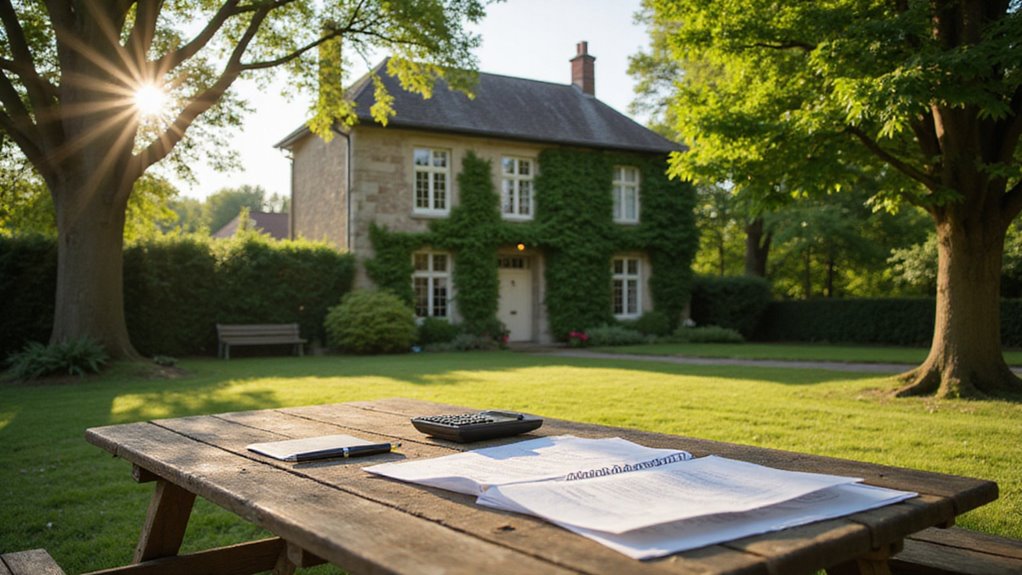Inherited property can transform into a tax nightmare faster than you can say “capital gains.” Suddenly you’re facing a hefty tax bill on property you’ve only recently acquired through loss. The IRS seems poised to take a significant chunk of your inheritance, adding financial stress during an already difficult time. Fortunately, several legitimate strategies exist to minimize or even eliminate this tax burden completely.
To avoid capital gains tax on inherited property, utilize the stepped-up basis rule. This resets the property’s tax basis to its fair market value on the date of death. When implemented correctly, this approach often eliminates tax on appreciation that occurred during the original owner’s lifetime.
In this blog I will explore everything about avoiding capital gains tax when selling inherited property.
Key Takeaways
- Utilize the stepped-up basis to reduce taxable gains to the property’s value at inheritance.
- Claim the primary residence exclusion if the property is used as your main home.
- Consider timing the sale during lower income years to minimize capital gains tax.
- Deduct selling expenses and improvements to decrease the taxable gain amount.
- Consult a tax professional to develop personalized strategies and ensure compliance.
What is capital gains tax on inherited property?

When you inherit property, your capital gains tax is based on its value at your loved one’s death, due to the stepped-up basis rule.
This means you only pay taxes on any increase in value after that date if you sell. Knowing the federal and state rates helps you plan your sale to minimize your tax liability.
Understanding stepped-up basis
Stepped-up basis resets an inherited property’s value to its fair market value at death. This typically lowers your capital gains tax liability when you sell.
The IRS allows heirs to use the date-of-death value rather than the original purchase price.
This tax benefit often eliminates years of appreciation from taxation. For example, property bought for $100,000 worth $500,000 at death creates no taxable gain on the $400,000 increase.
Consider selling soon after inheritance to maximize this advantage. However, property held longer may still accumulate new gains after the step-up. Furthermore, this provision applies to most inherited assets, not just real estate.
Determining your tax liability
You calculate capital gains tax on inherited property by subtracting the adjusted basis from the sale price. First, determine the property’s fair market value on the date of death. This becomes your stepped-up basis.
Next, track any improvements you made to the property. Federal tax rates range from 0% to 20% depending on your income level.
State taxes may also apply, varying by location. Remember to deduct eligible selling costs like agent commissions and closing fees. These deductions reduce your taxable gain significantly. Always consult a tax professional for your specific situation.
Federal vs. state capital gains tax rates
Federal capital gains tax rates range from 0% to 20% based on income, while state rates vary widely.
Federal brackets include 0%, 15%, and 20% depending on your tax bracket. Oklahoma residents pay a flat 4.75% state capital gains tax.
Inherited property receives a “step-up” in basis to fair market value at the time of inheritance. This adjustment eliminates capital gains tax on appreciation that occurred during the original owner’s lifetime.
As a result, you’ll only pay tax on gains that happen after you inherit the property. Timing your property sale strategically can significantly reduce your overall tax burden.
How long should you own inherited property?

There is no required timeframe for holding inherited property. The capital gains tax on inherited property is always treated as long-term regardless of how long you own it.
You need only complete these necessary steps before selling: verify your legal ownership, determine the stepped-up tax basis, and finalize the probate process.
The IRS considers all inherited property automatically as long-term capital assets even if you sell immediately after inheritance.
Your decision timing should focus on market conditions and your financial needs rather than tax holding periods. Consider consulting a tax professional for your specific situation.
What are the main tax exemptions for inherited homes?

You can reduce your capital gains tax through several exemptions, like the primary residence exclusion if you live in the home for at least two years before selling.
If the property is an investment, like-kind exchanges let you defer taxes by reinvesting in other real estate.
Charitable donations and loss deductions can also lower your tax bill if you meet specific criteria.
Primary residence exclusion (Section 121)
The Section 121 exclusion lets you avoid taxes on home sale profits. Single taxpayers can exclude up to $250,000 in capital gains, while married couples filing jointly can exclude up to $500,000. This applies to inherited homes you’ve made your main residence.
To qualify for this tax break, you must meet specific requirements. You must live in the home as your primary residence for at least 2 years during the 5-year period before selling it. Additionally, you should calculate the stepped-up basis correctly after inheritance.
For best results, avoid using the property solely as an investment. Furthermore, maintain detailed records that prove your residency status.
Like-kind exchanges (1031 exchanges)
Like-kind exchanges let you defer capital gains tax when trading property. You must swap investment properties of similar nature to qualify.
IRC Section 1031 governs these transactions and requires both properties to be held for business or investment purposes. The primary benefit is tax postponement, not elimination.
This strategy preserves your investment capital for growth. Many investors use qualified intermediaries to facilitate compliant exchanges.
You must identify replacement property within 45 days and complete the transaction within 180 days.
The deferred tax eventually becomes due when you sell without exchanging again. Property owners often use this tool for real estate portfolio expansion without cash flow disruption.
Charitable donations of property
Donating inherited property to qualified charities offers valuable tax advantages. You can claim a federal tax deduction equal to the property’s fair market value. To qualify for this deduction, the organization must have IRS-approved charitable status.
First, verify the charity’s qualification through the IRS database. Next, hire a professional appraiser to determine the property’s current value.
You can then deduct this full amount on your federal tax return, subject to certain limitations based on your income.
This strategy serves dual purposes. Your donation helps worthy causes while simultaneously reducing your taxable estate in a tax-efficient manner.
Loss deductions
Losses on inherited property can be deductible from your taxable income in specific situations.
The property must have been held as an investment, not as a personal residence, to qualify for this deduction. These deductions directly reduce your taxable income, potentially lowering your overall tax burden.
Furthermore, using loss deductions strategically can offset capital gains from other investments.
This approach creates tax-saving opportunities that preserve more of your wealth. With proper planning, these deductions become valuable tools in your financial strategy.
How to time your property sale strategically?
Timing your sale can save you money by considering your tax bracket and choosing a year when your income is lower.
Planning sales around market conditions in Oklahoma City can also help maximize your return.
Tax bracket considerations
Your tax rate on inherited property depends on your overall income. Schedule sales in years when your income is lower to pay less tax.
Capital gains tax rates vary from 0% to 20% based on your total taxable income. Consider selling in years when you earn less from other sources. This strategy keeps you in lower tax brackets.
Tax-efficient inheritance strategies can help manage your tax burden. For example, spread sales across multiple tax years instead of selling everything at once.
Additionally, look for deductions that might offset gains. These deductions could include property expenses or charitable contributions. Strategic planning prevents unexpected tax surprises.
Market timing benefits
Strategic selling helps maximize property profits and minimize tax burdens. The real estate market fluctuates throughout the year, with certain seasons bringing higher prices.
Capital gains taxes may decrease when you sell during periods of lower income. Your beneficiaries can receive more funds when you time sales properly.
Well-timed sales often occur during spring and early summer when buyer demand peaks. As a result, you might secure better offers and faster closings.
Tax laws allow certain exemptions when you’ve lived in your primary residence for at least two years. Consider market conditions alongside your personal financial situation for optimal results.
Annual income planning
Time your property sales strategically to minimize capital gains taxes. Consider selling during years when your income is lower than usual. Tax brackets determine how much you pay on capital gains. Your inherited property’s value benefits from careful tax planning.
Coordinate selling decisions with major expense deductions for additional tax savings. This approach reduces your effective tax rate significantly.
Communication with fellow beneficiaries prevents unexpected tax consequences. Tax-advantaged accounts offer protection for inheritance proceeds when applicable. The goal is preserving more inheritance value through thoughtful timing.
Furthermore, proper planning serves both you and your family’s long-term financial interests.
What expenses can offset your capital gains?
You can lower your capital gains by tracking expenses that add to your property’s basis, like major improvements.
Selling costs such as commissions and legal fees also cut into your gains, saving you money on taxes.
While owning the property, routine costs like maintenance and property taxes don’t directly reduce gains but may be deductible if you rented it out.
Improvement costs that increase basis
Improvement costs boost your inherited property’s basis, reducing capital gains tax. Legitimate improvements include structural additions, major renovations, new room construction, and system upgrades. Each improvement increases the property’s value in the IRS’s eyes.
To claim these improvements, maintain detailed records with receipts and documentation. Photos before and after projects provide visual evidence of changes made.
The higher your basis becomes, the less taxable gain you’ll face when selling. The IRS distinguishes between improvements (which increase basis) and repairs (which generally don’t). This difference matters significantly at tax time.
Selling expenses and deductions
You can deduct costs related to selling inherited property from your taxable gain. Deductible expenses include real estate commissions, attorney fees, title insurance, and closing costs. These deductions lower your capital gains tax liability.
The IRS allows these deductions because they represent the true cost of selling the property. To claim these deductions, keep detailed records of all expenses.
Furthermore, you should save receipts and settlement statements for tax purposes. These tax benefits make property sales more affordable while maximizing your inheritance value.
Carrying costs while owning the property
Owning inherited property involves ongoing expenses that can reduce your tax burden. Property taxes, maintenance, interest, and insurance premiums all qualify as carrying costs that offset capital gains.
After inheritance, track every expense related to property ownership. These deductions make managing the property more affordable while you decide its future.
For instance, document all repair costs and tax payments meticulously. Furthermore, keep records of mortgage interest and insurance payments. Each documented expense reduces your taxable gain when you eventually sell the inherited property.
Can you leverage installment sales?
You can spread your capital gains tax liability over several years by using an installment sale, which might lower your yearly tax burden.
However, you need to meet specific legal requirements, like providing a contract that includes payments in future years.
Make sure to report the income correctly using IRS Form 6252 to stay compliant and avoid penalties.
Spreading tax liability over time
Installment sales allow you to pay capital gains taxes gradually over several years instead of all at once. This helps manage your cash flow and reduces the tax burden on inheritance.
You must create a legally binding contract for the installment sale. The IRS requires reporting income only as you receive payments under Internal Revenue Code Section 453. Complete Form 6252 with your tax return each year.
Furthermore, all installment sale terms must meet legal requirements to ensure compliance. As a result, your tax liability spreads across multiple tax periods. This approach works especially well for high-value assets.
Legal requirements for installment sales
Installment sales for inherited property require specific legal documentation and payment structure. Your contract must clearly outline payment amounts and scheduled dates.
Payments must span multiple years to qualify as an installment sale. You need to report this income annually using IRS Form 6252.
The arrangement must comply with both federal tax codes and Oklahoma state laws. This approach helps reduce immediate tax burden by spreading capital gains across several years.
Federal law allows you to defer taxes on portions of the sale not yet received.
Tax reporting considerations
Report installment sales correctly to spread capital gains across multiple tax years. This reduces your tax burden in any single year. You must file IRS Form 6252 for installment sales.
Report income only when you receive it, following Internal Revenue Code §453. Keep detailed records of all payments to allocate your gain properly. For Oklahoma properties, special rules apply to inherited real estate.
The IRS also has specific guidelines for reporting gains on inherited property. These reporting steps help minimize tax liability while maintaining full compliance. Proper documentation creates a clear audit trail and potentially saves you thousands in taxes.
Ready to sell your inherited property without tax headaches?
Yes, you can sell inherited property with minimal tax burden. The tax code offers two key advantages to help you.
When someone dies, inherited property receives a “step-up in basis” to its fair market value on the date of death. This reduces or eliminates capital gains tax when you sell.
Additionally, the home sale tax exemption allows you to exclude up to $250,000 in profits ($500,000 for married couples) if you’ve lived in the home as your primary residence for at least two years.
With proper planning, these benefits can significantly reduce your tax liability when selling inherited real estate.
Avoiding Capital Gains Tax on Inherited Property
You can legally avoid most capital gains taxes on inherited property through several strategies. The tax code offers significant advantages to heirs.
Property receives a “step-up” in basis to its fair market value on the date of death. This eliminates tax on appreciation that occurred during the deceased owner’s lifetime. Selling shortly after inheritance typically results in minimal taxable gains.
You can further reduce liability by deducting qualifying expenses. These include property improvements, selling costs, and certain closing fees.
Tax rules allow you to offset gains with these legitimate deductions. The tax benefits of inheritance create opportunities for substantial savings when handled correctly.
Looking for assistance with your inherited property in Oklahoma City? Contact Shawn Buys Houses today!
Shawn Buys Houses can help with your inherited property in Oklahoma City. We provide expert guidance through the inheritance process while keeping costs low.
Our team specializes in reducing inheritance taxes and maximizing exclusion benefits. Inheritance tax savings can be substantial when handled correctly.
We work efficiently to help you navigate property sales without unnecessary expenses. Furthermore, we understand budget concerns during inheritance transitions.
The process becomes simpler with our support. Contact us today to discuss your specific inheritance situation and potential solutions.
Frequently Asked Questions
Can I Exclude Capital Gains if I Sell Inherited Property Quickly?
You can’t generally exclude capital gains if you sell inherited property quickly. The stepped-up basis reduces gains, but unless you meet the primary residence exclusion or other specific rules, most gains will be taxable regardless of sale timing.
Does Oklahoma Offer Any Additional Tax Benefits for Inherited Homes?
Oklahoma doesn’t offer additional tax benefits for inherited homes beyond federal rules. You can claim the primary residence exclusion if applicable, but state-specific incentives or deductions are generally unavailable, so focus on federal strategies to minimize your tax bill.
Are There Specific Records I Need to Keep for Tax Purposes?
Consider your records as the keys to access savings; keep detailed receipts of improvements, sale expenses, and transfer documents. This thoroughness safeguards your tax position, helping you serve others by maximizing your financial resources efficiently.
How Does a Primary Residence Exclusion Apply to Inherited Property?
You can exclude up to $250,000 ($500,000 if married) from capital gains if you use the inherited home as your primary residence for at least two of five years before selling, helping others avoid unnecessary taxes.
Can I Defer Capital Gains Taxes Through a 1031 Exchange on Inherited Property?
Yes, you can defer capital gains taxes on inherited property through a 1031 exchange if it’s investment or business property. Ensure the replacement property qualifies and follow IRS rules to maximize your tax deferral benefits.

